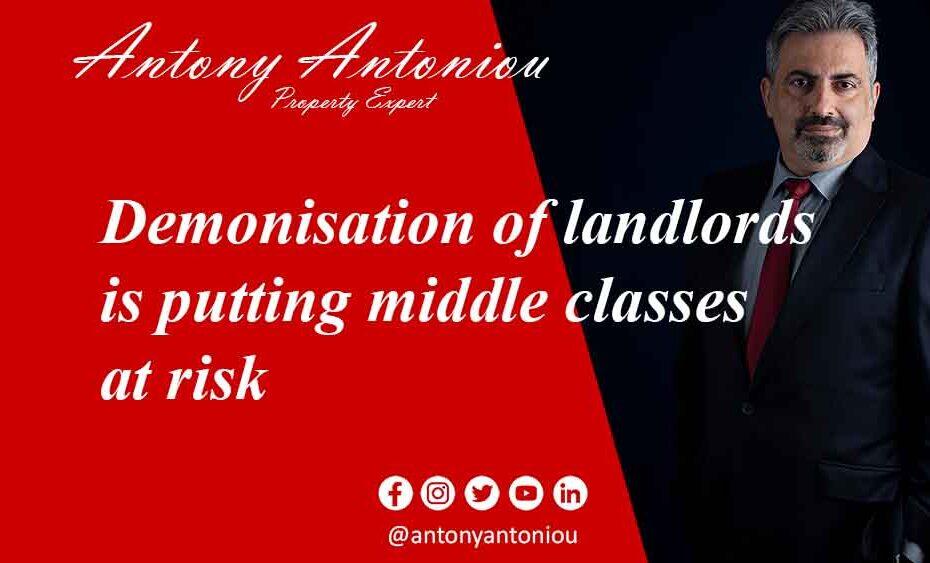Demonisation of landlords is putting middle classes at risk
The Challenges Faced by Landlords and the Impact on the Middle Class: A Warning from Skipton Building Society
In the ever-evolving landscape of the property market, a warning has emerged from the CEO of Skipton Building Society, Stuart Haire. According to him, the vilification of landlords is not only harming this group but also jeopardizing the stability of the middle class. The confluence of escalating costs, burdensome taxes, and mounting regulations is not only exacerbating the housing crisis but also has far-reaching consequences for social cohesion.
The Triple Blow: Taxes, Costs, and Red Tape
Stuart Haire’s stark warning paints a somber picture of the challenges plaguing landlords in Britain. He points to a trifecta of factors that are driving the difficulties landlords face: oppressive taxes, rising mortgage expenses, and the imposition of additional regulations. This toxic mix is not only causing some landlords to consider offloading their properties but is also squeezing the supply of available rental units.
Haire articulates, “The demand has gone. You’ve got a slightly demonised private rental sector and landlords are getting squeezed from a tax basis and from the increased mortgage rates they are having to pay if they have debt associated with that property.”
Impact on the Middle Class and Social Stability
The repercussions of these challenges are far-reaching and extend well beyond the realm of landlords. Haire draws a direct connection between unaffordable property prices, soaring rents, and the gradual erosion of the middle class. He warns that these factors are driving more people towards social housing or even compelling them to stay with their parents for longer periods.
The consequences are dire, with Haire emphasizing that the dwindling middle class threatens social stability. He explains, “You get fewer people in the middle class, it becomes either a greater plutocracy or it becomes ungovernable. If we’re not a caring society and more people move into vulnerable thresholds, more desperate acts happen.”
Rising Costs and Energy Efficiency Regulations
Haire highlights another contributing factor to the escalating costs faced by landlords – the requirement to enhance the energy efficiency of properties. These additional expenses are pushing many landlords to a breaking point, creating a ripple effect that could ultimately lead to reduced rental supply and heightened prices, forcing more people into social housing.
A Call for Government Intervention
Haire’s warnings aren’t merely a critique; they come with a call to action directed at the government. He urges authorities to reconsider the impact of the mounting taxes and costs on both landlords and renters. The shrinking number of landlords entering the market and the difficulty of selling properties due to decreased demand and rising mortgage expenses are tangible consequences of these policies.
“Higher debt and lower savings would make renters more likely to face hard financial choices in the future – like defaulting or cutting spending – which could trigger or worsen a wider economic downturn,” Haire says, underscoring the potential economic ramifications.
Skipton Building Society’s Solution
The gravity of these concerns has motivated Skipton Building Society to introduce a groundbreaking solution: a 100% mortgage for first-time buyers who have demonstrated responsible rental behavior for a year. This initiative not only speaks to the challenges faced by renters but also emphasizes the need for innovative strategies to counter the housing crisis and provide a pathway to homeownership.
A Reflection on Homeownership and Personalization
Haire’s analysis extends beyond the financial realm. He suggests that the British tendency to spend a significant amount of time indoors, coupled with a desire for personalization, creates a unique perspective on homeownership. Rental accommodations often fall short in allowing individuals to truly make a space their own, and this has added a distinct layer to the complexities of the housing landscape in the UK.
In conclusion, the issues faced by landlords in Britain are far from isolated concerns. They have the potential to reshape the socio-economic landscape, impacting the middle class and social cohesion. Stuart Haire’s cautionary words serve as a reminder that policy decisions in the housing sector have a profound ripple effect that extends well beyond the realm of property ownership. As the debate around housing policies continues, it remains to be seen how the delicate balance between landlords, renters, and the middle class will be maintained in the years to come.

